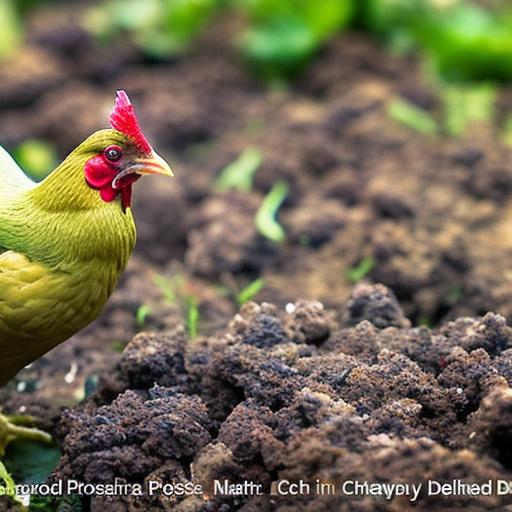Bradford Council is encouraging residents to keep chickens in their backyard as a way to promote sustainable living and reduce food waste. By keeping chickens, residents can enjoy the benefits of fresh eggs while also reducing their carbon footprint. This initiative aligns with the council’s efforts to create a more environmentally friendly community.
Keeping chickens in your backyard has numerous benefits. Not only do you have a constant supply of fresh eggs, but you also reduce food waste by feeding your chickens kitchen scraps and leftovers. Chickens are excellent at converting food waste into high-quality fertilizer, which can be used in your garden to promote healthy plant growth. Additionally, keeping chickens can be a rewarding and educational experience for both adults and children.
Key Takeaways
- Bradford Council promotes keeping chickens for a variety of reasons
- Keeping chickens in your backyard has numerous benefits
- A chicken coop is essential for the health and happiness of your chickens
- Bradford Council provides guidelines for keeping chickens
- Choosing the right breed of chicken is important for your backyard setup
Benefits of Keeping Chickens in Your Backyard
There are several benefits to keeping chickens in your backyard. One of the most obvious benefits is the availability of fresh eggs. Instead of relying on store-bought eggs, you can have a constant supply of eggs right from your own backyard. Fresh eggs are not only tastier but also more nutritious than store-bought eggs.
Another benefit of keeping chickens is the reduction of food waste. Chickens are omnivorous and can eat a wide variety of kitchen scraps and leftovers. By feeding them your food waste, you not only reduce the amount of waste that goes into landfills but also save money on chicken feed.
In addition to providing fresh eggs and reducing food waste, keeping chickens also produces natural fertilizer. Chicken manure is rich in nutrients and can be used to fertilize your garden or plants. This eliminates the need for chemical fertilizers, promoting a more sustainable and eco-friendly approach to gardening.
Furthermore, keeping chickens in your backyard helps reduce your carbon footprint. By producing your own eggs locally, you decrease the demand for eggs that need to be transported long distances, reducing greenhouse gas emissions associated with transportation.
The Importance of a Chicken Coop for Happy and Healthy Chickens
A chicken coop is essential for keeping chickens healthy and happy. It provides them with a safe and secure environment to live in, protecting them from predators and adverse weather conditions. A well-designed chicken coop also ensures that chickens have enough space to move around and engage in natural behaviors.
There are different types of chicken coops available, ranging from small portable coops to larger stationary ones. The type of coop you choose depends on the number of chickens you plan to keep and the available space in your backyard. It is important to consider factors such as ventilation, lighting, and insulation when designing or selecting a chicken coop.
Proper ventilation is crucial for maintaining good air quality inside the coop. It helps remove excess moisture, ammonia, and odors, which can lead to respiratory problems in chickens. Adequate lighting is also important as it helps regulate their internal clock and promotes egg production. Insulation is necessary to keep chickens warm during colder months and cool during hot summers.
Bradford Council’s Guidelines for Keeping Chickens
Bradford Council has set guidelines for residents who wish to keep chickens in their backyard. These guidelines aim to ensure that the keeping of chickens does not cause any nuisance or harm to the community. Some of the guidelines include:
1. Limit on the number of chickens: Residents are allowed to keep a maximum number of chickens, typically between 4-6, depending on the size of their backyard. This limit helps prevent overcrowding and ensures that chickens have enough space to roam.
2. Noise levels: Residents must ensure that their chickens do not create excessive noise that disturbs their neighbors. This can be achieved by selecting quieter breeds or providing soundproofing measures in the chicken coop.
3. Waste management: Residents are responsible for managing chicken waste properly. This includes regularly cleaning the coop and disposing of waste in an appropriate manner. Composting chicken manure is encouraged as it can be used as fertilizer for plants.
By following these guidelines, residents can enjoy the benefits of keeping chickens while also being considerate of their neighbors and the environment.
Choosing the Right Breed of Chicken for Your Backyard
When considering keeping chickens in your backyard, it is important to choose the right breed that suits your needs and environment. There are various breeds of chickens available, each with its own characteristics and traits.
Some breeds are known for their high egg production, making them ideal for those who want a constant supply of fresh eggs. Examples of high egg-producing breeds include Leghorns, Rhode Island Reds, and Sussex. These breeds are known for their excellent egg-laying abilities and can provide a steady supply of eggs throughout the year.
Other breeds are known for their docile temperament, making them suitable for families with children or those who want chickens as pets. Breeds such as Silkies and Orpingtons are known for their friendly and calm nature, making them great companions.
It is also important to consider the adaptability of the breed to your local climate. Some breeds are more cold-hardy and can withstand colder temperatures, while others are better suited for warmer climates. Researching and selecting a breed that is well-suited to your climate will ensure that your chickens thrive in their environment.
Building Your Own Chicken Coop: Tips and Tricks

Building your own chicken coop can be a rewarding project that allows you to customize the coop to your specific needs and preferences. Here are some tips and tricks to consider when building your own chicken coop:
1. Use recycled materials: Building a chicken coop doesn’t have to be expensive. Consider using recycled materials such as old pallets or reclaimed wood to construct the coop. Not only does this save money, but it also reduces waste and promotes sustainability.
2. Design for easy cleaning: A clean coop is essential for the health of your chickens. Design the coop in a way that makes it easy to clean and maintain. Consider features such as removable roosting bars and nesting boxes, as well as easy access to the coop for cleaning purposes.
3. Provide adequate space: Chickens need enough space to move around and engage in natural behaviors. Ensure that your coop provides enough space for your chickens to roam freely. The general rule of thumb is to provide at least 4 square feet of space per chicken inside the coop and 10 square feet per chicken in the outdoor run.
4. Consider predator-proofing: Predators can pose a threat to your chickens, so it is important to design the coop with predator-proofing measures in mind. This can include burying wire mesh around the perimeter of the coop to prevent digging predators, and using secure latches on doors and windows.
Maintaining a Clean and Safe Chicken Coop
Maintaining a clean and safe chicken coop is essential for the health and well-being of your chickens. A clean coop helps prevent the spread of diseases and parasites, while a safe coop protects your chickens from predators.
Regular cleaning is necessary to remove waste, dirt, and debris from the coop. This can be done by scooping out soiled bedding, removing any leftover food, and scrubbing surfaces with a natural cleaning solution. Avoid using harsh chemicals as they can be harmful to chickens.
Disinfecting the coop periodically is also important to kill any bacteria or parasites that may be present. This can be done by using natural disinfectants such as vinegar or hydrogen peroxide. Allow the coop to dry thoroughly before adding fresh bedding.
In addition to cleaning, it is important to regularly inspect the coop for any signs of damage or wear. Repair any holes or gaps in the walls or roof to prevent predators from entering. Replace any worn-out or broken parts of the coop to ensure its structural integrity.
Feeding and Watering Your Chickens: What You Need to Know
Proper feeding and watering are essential for the health and well-being of your chickens. Providing a balanced diet and clean water ensures that your chickens receive the necessary nutrients for optimal growth and egg production.
Chickens require a balanced diet that consists of protein, carbohydrates, fats, vitamins, and minerals. Commercial chicken feed is available in different formulations depending on the age and purpose of the chickens. It is important to choose a feed that is appropriate for your chickens’ needs.
In addition to commercial feed, chickens can also be fed kitchen scraps and leftovers. However, it is important to avoid feeding them anything that is toxic or harmful to their health. Avoid feeding them onions, garlic, chocolate, caffeine, or any spoiled or moldy food.
Clean water is essential for chickens as they need to stay hydrated throughout the day. Provide fresh water in clean containers that are easily accessible to the chickens. Consider using waterers that prevent spillage or contamination.
Common Health Issues in Chickens and How to Prevent Them
Chickens can be susceptible to various health issues, including mites, lice, respiratory infections, and parasites. However, with proper care and preventive measures, many of these health issues can be avoided.
Regular cleaning and disinfecting of the coop are important for preventing the spread of parasites such as mites and lice. Inspect your chickens regularly for any signs of infestation, such as feather loss or excessive scratching. If an infestation is detected, treat it promptly with appropriate medications or natural remedies.
Respiratory infections can occur in chickens due to poor ventilation or exposure to damp conditions. Ensure that your coop has proper ventilation to maintain good air quality. Avoid overcrowding your chickens as this can increase the risk of respiratory infections.
Providing a balanced diet that meets the nutritional needs of your chickens is important for their overall health and immune system. Ensure that they have access to fresh water and a balanced feed that contains the necessary vitamins and minerals.
Why Keeping Chickens is a Rewarding Experience for You and Your Community
Keeping chickens in your backyard can be a rewarding experience that provides numerous benefits. From fresh eggs and reduced food waste to promoting sustainable living, keeping chickens aligns with the goals of Bradford Council to create a more environmentally friendly community.
By following Bradford Council’s guidelines for keeping chickens, residents can enjoy the benefits of fresh eggs while being considerate of their neighbors and the environment. Choosing the right breed of chicken and building a well-designed chicken coop ensures that your chickens are happy and healthy.
Maintaining a clean and safe chicken coop, providing proper nutrition, and preventing common health issues are essential for the well-being of your chickens. With proper care and attention, keeping chickens can be a rewarding experience that not only benefits you but also your community.
If you’re interested in Bradford Council’s decision to allow residents to keep chickens, you might also want to check out this article on large chicken coop ideas. It provides valuable insights and inspiration for creating a spacious and comfortable home for your feathered friends. Additionally, if you’re not ready to commit to owning a chicken coop, you can explore the option of renting one instead. This article on renting a chicken coop offers useful information on how to get started. Lastly, if you’re considering keeping turkeys alongside your chickens, you may be wondering if turkeys need a coop. This informative article answers that question and provides guidance on providing suitable housing for turkeys.
FAQs
What is the article about?
The article is about Bradford Council’s decision to allow residents to keep chickens in their gardens.
Why did Bradford Council make this decision?
Bradford Council made this decision to promote sustainable living and encourage residents to produce their own food.
What are the rules for keeping chickens in Bradford?
Residents are allowed to keep up to six chickens in their gardens, but they must be kept in a secure coop and run. Roosters are not allowed.
Do residents need a permit to keep chickens?
No, residents do not need a permit to keep chickens in Bradford.
What are the benefits of keeping chickens?
Keeping chickens can provide a source of fresh eggs, reduce food waste by composting scraps, and promote sustainable living.
Are there any concerns about keeping chickens in residential areas?
Some concerns include noise and odor, but if chickens are kept in a secure coop and run and properly cared for, these issues can be minimized.
What should residents do if they want to keep chickens?
Residents should research and educate themselves on how to properly care for chickens before getting them. They should also check with their local council for any specific rules or regulations.
Meet Walter, the feathered-friend fanatic of Florida! Nestled in the sunshine state, Walter struts through life with his feathered companions, clucking his way to happiness. With a coop that’s fancier than a five-star hotel, he’s the Don Juan of the chicken world. When he’s not teaching his hens to do the cha-cha, you’ll find him in a heated debate with his prized rooster, Sir Clucks-a-Lot. Walter’s poultry passion is no yolk; he’s the sunny-side-up guy you never knew you needed in your flock of friends!







